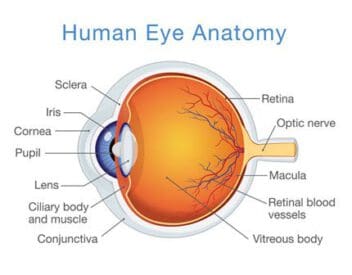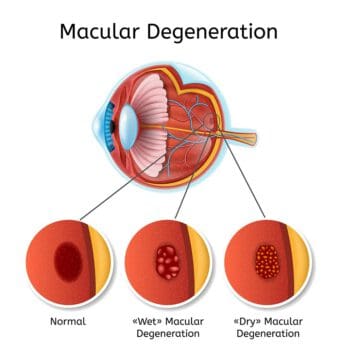
Medically Reviewed by Roberto Roizenblatt, M.D.
Vitreoretinal Diseases & Surgery: A Guide
Home / Vision Education Center /
Last Updated:

Medically Reviewed by Roberto Roizenblatt, M.D.
Vitreoretinal diseases are a group of eye conditions concerning the retina and the vitreous in your eye. These structures can become damaged, often with age, and lead to eye problems that can affect your vision.
Table of Contents
Age-related macular degeneration is a common vitreoretinal condition that occurs in people as they age. The macula becomes damaged, and central vision is impaired. Fortunately, symptom management and surgical treatment options are available.
Posterior vitreous detachment occurs naturally in everyone, and it usually happens over the age of 50. With age, the vitreous gradually detaches from the retina, usually without any problems. Complications, such as retinal tear or detachment, can sometimes occur during this process.
Retinal tears can be caused by injury to the eye, but they are primarily the result of posterior vitreous detachment. Retinal tears can lead to retinal detachment. In such a case, in office or surgical treatment is necessary.

A vitreoretinal surgery is any type of surgical intervention performed on the vitreous or the retina. With modern advances in eye surgery, vitreoretinal surgeries are minimally invasive, highly effective, and have relatively quick recovery times.
What Are Vitreoretinal Diseases?
Vitreoretinal diseases are a type of eye condition that affect the retina and the vitreous, a gel-like substance in the eye is contained inside the vitreous cavity.
The retina is the layer on the back of your eye that is sensitive to light. It focuses images you see and transmits that information to the brain.
You deserve clear vision. We can help.
With 135+ locations and over 2.5 million procedures performed, our board-certified eye surgeons deliver results you can trust. Your journey to better vision starts here.
When these two structures are damaged for any reason, your eye health and vision can be compromised.

Types of vitreoretinal diseases include:
- Age-related macular degeneration.
- Diabetic retinopathy.
- Flashes and floaters (posterior vitreous detachment).
- Macular holes.
- Macular pucker.
- Retinal tears or detachments.
- Retinoblastoma.
- Stargardt disease.
- Uveitis.
Many of these vitreoretinal diseases get progressively worse with age. Weakening of structures in the eye can lead to complications, such as retinal detachments or holes.
Age-Related Macular Degeneration
Macular degeneration, formally known as age-related macular degeneration (AMD), is a loss of central vision stemming from damage to a part of your retina called the macula. There are two types of AMD: Dry AMD and Wet AMD.

Dry AMD is the more common of the two, accounting for about 90 percent of AMD cases. Dry AMD is characterized by the existence of drusen and macular atrophy.
Wet AMD is less common but more serious than Dry AMD. The hallmark of Wet AMD is the growth of irregular blood vessels under the retina. When they leak, the blood vessels can scar the macula. This condition affects vision quickly and significantly.
Posterior Vitreous Detachment
Posterior Vitreous Detachment (PVD) is a condition indicated by a separation between the posterior vitreous cortex and the neurosensory retina. Unfortunately, you can easily have this condition and not know it because symptoms are non-specific.
Symptoms include the presence of floaters or a change in existing floaters, the seeming presence of hairs within vision and a light shadow.
Your eye doctor will be concerned about you having a tear or detached retina – therefore a fundoscopic eye exam is performed.
Retinal Tears or Detachment
Retinal tears are small tears that form in the retina. Tears can turn into detachments, and detachments threaten a major loss of vision – possibly permanently, if untreated.
Treatment for an early stage tear is low risk, and the two typical methods are cryotherapy and laser surgery.
Traditional surgery, laser surgery and cryotherapy are the treatments for a detachment.
You deserve clear vision. We can help.
With 135+ locations and over 2.5 million procedures performed, our board-certified eye surgeons deliver results you can trust. Your journey to better vision starts here.
Vitreoretinal Surgery
Vitreoretinal surgery refers to surgical procedures conducted deep in the eye to preserve sight. Any number of conditions can be a reason to have one of these surgeries:
- Macular holes
- Macular pucker
- Retinal tears and detachments
- Intolerable floaters
- Diabetic retinopathy causing retinal damage
Surgical Treatment Options
There are many different surgical options available for treating vitreoretinal diseases.
Preventing Vitreoretinal Diseases
While most vitreoretinal diseases have comprehensive treatment procedures, sometimes prevention is better than cure.
One thing to note is that vitreoretinal diseases refer to a broad range of conditions, so there’s no one-size-fits-all approach to preventing them.
Before rolling out the prevention regimen, it helps to examine the factors causing the diseases. Doing so could shine a light on what’s needed to formulate an effective preventative process.
Here are some of the vitreoretinal diseases risk factors:
- Eye trauma
- General Predisposition
- Others
- Uncontrolled diabetes
With that in mind, these are some of the most effective ways of preventing vitreoretinal diseases:
- Prevent eye injuries using protective goggles
- Consistent eye check-ups, at least once every two years
- Regular medical checkups to control medical conditions
- Although it’s not conclusive, some research shows a connection between prolonged sun exposure and age-related macular degeneration. Wearing hats and sunglasses when you step out should help avoid it.
Although it’s not conclusive, some research shows a connection between prolonged sun exposure and age-related macular degeneration. Wearing hats and sunglasses when you step out should help avoid it.
To prevent retinal detachment, your eye surgeon may recommend repairing retinal tears using laser or cryo technology.
Is Vitreoretinal Surgery for Me?
A discussion between you and your ophthalmologist will help you decide if vitreoretinal surgery is right for you. Depending on your condition, there are many different treatment options available that come with varying degrees of risks and potential side effects.

Medical, nonsurgical treatment options are also available for some vitreoretinal diseases. Anti-VEGF therapy, for example, utilizes medications to treat conditions in the eye by reducing swelling and the growth of blood vessels.
If you are experiencing symptoms of any kind of vitreoretinal disease, it is important to see your ophthalmologist as soon as you can.
Some conditions, such as retinal detachment, can progress quickly and lead to more serious complications, like vision loss. If detected and treated early, serious eye and vision complications can be avoided. With prompt care, you can quickly return to your daily life with healthy and clear vision.
You deserve clear vision. We can help.
With 135+ locations and over 2.5 million procedures performed, our board-certified eye surgeons deliver results you can trust. Your journey to better vision starts here.
References
- Posterior Vitreous Detachment. (2016). American Society of Retina Specialists.
- Retinal Detachment. (June 2019). National Eye Institute.
- Retinal Tears. (2016) American Society of Retina Specialists.
- Vitreoretinal Disease. Milford Eye Clinic.
- Vitreoretinal Diseases and Surgery. UT Southwestern Medical Center.
- Vitreo Retinal Diseases. (June 2018). National University Hospital.
- What Is Macular Degeneration? (February 2020). American Academy of Ophthalmology.
- Age-Related Macular Degeneration. (August 2019). National Eye Institute.
- Chapter 19 – Diet and Supplements in the Prevention and Treatment of Eye Diseases. (2017). ScienceDirect.
- What Is Macular Degeneration? (January 2021). American Academy of Ophthalmology.
- Posterior Vitreous Detachment. (August 2021). American Academy of Ophthalmology.
- Retinal Detachment. (June 2021). American Academy of Ophthalmology.
- Are You Ready for the Future of Vitreoretinal Surgery? (November-December 2018). Retina Today.

Dr. Roberto Roizenblatt received his medical degree from the University of Sao Paulo in Brazil. He went on to complete an internship in Internal Medicine at Jacobi Medical Center in New York, followed by successfully completing two residencies in ophthalmology at the Federal University of Sao Paulo and later at the University of California, Irvine.
This content is for informational purposes only. It may have been reviewed by a licensed physician, but is not intended to serve as a substitute for professional medical advice. Always consult your healthcare provider with any health concerns. For more, read our Privacy Policy and Editorial Policy.